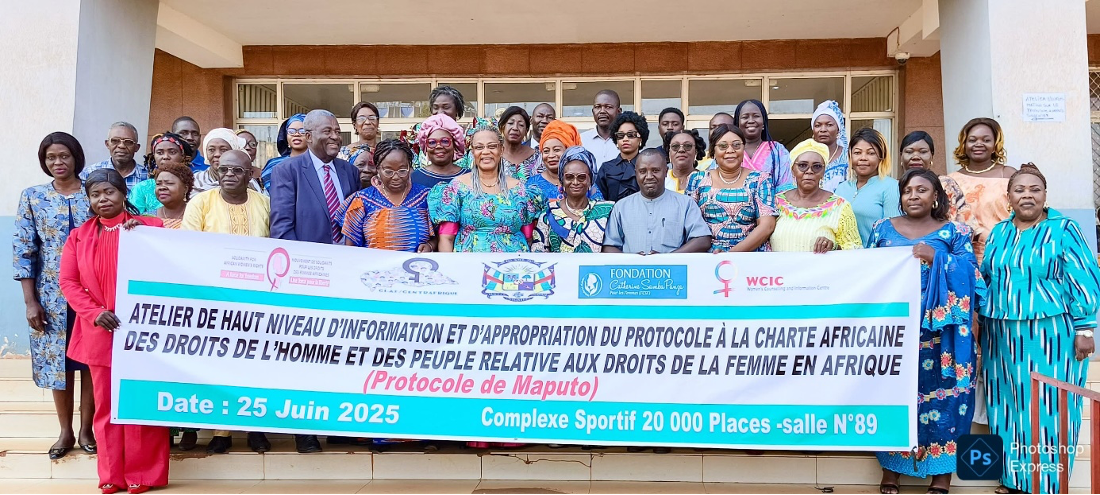The ratification, officially deposited on July 29, 2025, marks a decisive commitment by the CAR government to enhance legal protections, combat gender-based violence, and drive social and economic empowerment for its female population.
Central African Republic Ratifies Maputo Protocol: A New Dawn for Women’s Rights

By Bheki Dlamini
In a historic and deeply hopeful step for women’s rights, the Central African Republic (CAR) has become the 46th African Union member state to ratify the Maputo Protocol, a landmark treaty dedicated to protecting and promoting the rights of women and girls across the continent.
The ratification, officially deposited on July 29, 2025, marks a decisive commitment by the CAR government to enhance legal protections, combat gender-based violence, and drive social and economic empowerment for its female population.
The Maputo Protocol, formally known as the Protocol to the African Charter on Human and Peoples’ Rights on the Rights of Women in Africa, was adopted by the African Union in 2003 and is considered one of the most comprehensive frameworks worldwide for advancing gender equality.
It mandates African nations to end violence against women and girls, uphold reproductive rights, abolish harmful practices like child marriage and female genital mutilation, and promote equitable participation in political, economic, and public life.
READ MORE: Trafficked, Tortured and Forgotten: The Modern Enslavement
For the Central African Republic, a nation long plagued by conflict, political instability, and severe human rights challenges, this commitment stands out as a beacon of hope. Women and girls in CAR have faced disproportionate suffering amid ongoing cycles of violence, displacement, and systemic neglect.
By ratifying this protocol, the CAR government signals its commitment to upholding human rights rigorously, enacting gender-sensitive laws, and forging a future where women can live safely, freely, and with equal opportunities.
This milestone is the culmination of sustained advocacy by civil society groups and regional partners, notably the Solidarity for African Women’s Rights Coalition (SOAWR), which led strategic missions to the CAR in mid-2025. During a critical workshop in Bangui in June, over 40 participants, including government officials, activists, and development partners, converged to reinforce the importance of the Protocol.
Dr. Marthe Augustine Kirimat, Minister for Gender Promotion, Women’s Protection, Family, and Children, expressed gratitude to SOAWR and underscored the Protocol’s symbolic and practical significance as an instrument of gender justice firmly embraced by CAR.
Barrister Yveline Ntanfai of the Women’s Counselling and Information Centre in Cameroon reflected, “CAR today stands tall as a champion of women’s rights on the continent. This achievement highlights the power of collaboration across governments, civil society, and regional bodies to realize transformative change.”
Echoing this sentiment, Dr. Tom Mulisa of the Great Lakes Initiative for Human Rights and Development in Rwanda stated, “The resilience and engagement of women in CAR have been pivotal in this victory. Their unified voice compelled state action and now opens the door for true empowerment.”
READ MORE: Women’s empowerment shapes stronger societies
The Maputo Protocol goes beyond legislation. It obliges states to adopt survivor-centered approaches to address sexual and gender-based violence, ensure access to justice and legal aid, and eradicate discriminatory customs. It promotes education and advocacy to change harmful societal norms and encourages international cooperation to advance research, capacity building, and the sharing of best practices.
As Esther Waweru, Senior Legal Advisor at Equality Now, observed, “While we celebrate CAR’s ratification, the journey to fully realize women’s rights across Africa continues. The Maputo Protocol remains a critical shield against setbacks as anti-rights movements rise in some countries.”
CAR’s ratification is a crucial step towards meeting Sustainable Development Goal 5, which targets gender equality and the empowerment of all women and girls by 2030. It challenges other AU member states yet to ratify the treaty to follow suit without reservations that could dilute its protections.
For millions of women and girls in the Central African Republic, this ratification represents not only hope but a promise, a promise of laws that protect, opportunities that empower, and a society where their voices are heard and rights upheld.
This Sunday, as the Central African Republic joins its African neighbors in this vital commitment, the continent takes another stride towards justice and dignity for all its daughters.
Subscribe to Our Newsletter
Keep in touch with our news & offers
Thank you for subscribing to the newsletter.
Oops. Something went wrong. Please try again later.










